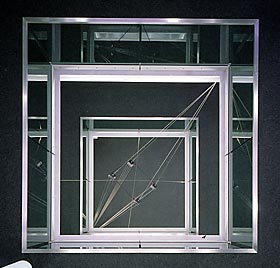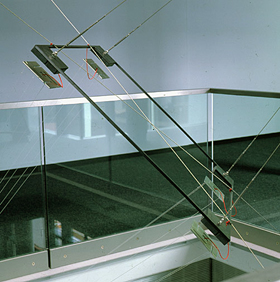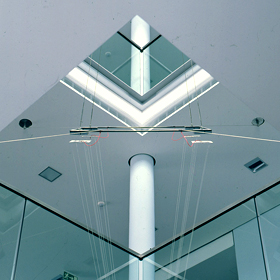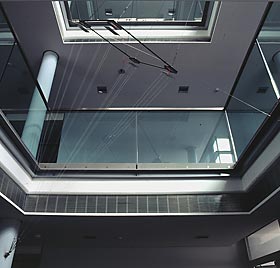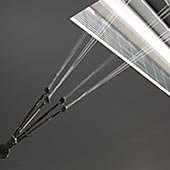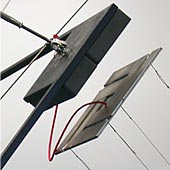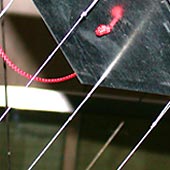untitled (Drachen [kites])
2002
art in architecture
tecmath AG / Human Solutions, Kaiserslautern
supported by Stefan Eickenberg, M&E GmbH
permanant installation
with iron frame and loadestones
This fragile construction with its subtle equilibrium combines
graphic elements with a sense of volume, blending the visible
and the invisible, heaviness and lightness.
pdf
"There is a certain kind of rock, called magnetic,
which leaves all other materials unmoved
and attracts only iron. Sometimes it is also displayed
floating freely, suspended by the concealed force above (…)"
Theodoret of Cyrrhus, 393-465 A.D
Extending diagonally over a three-storey light well,
the installation spans half its height, constantly offering new
perspectives on the work from above, below and from
all sides.
The initial impression is of simple rigorous geometric
forms. With the materials reduced to the bare minimum,
the lines and flat surfaces (cables and magnets) compose a double
pyramid set at a 45° angle. The bases of the pyramids
are formed by a square frame with four magnets
at the vertices.
Only when you look closer do you realise that the
hanging structure actually cannot be suspended: a gap
just a hand-span wide separates the pyramids.
The lower of the two - made up of four magnetic planes
tethered in position like small kites - stands on its apex,
free and inviolate within this space. Although the two geometric
forms do not touch, the strong magnetic field exerted by the
upper section holds the lower pyramid in place.
The magnets are clearly visible. They strain towards each other,
prevented from smashing together only by the cables holding them
- which do not disrupt this tug of attraction, but merely hold it in check.
The red rigging lines secure this fragile connection. If the configuration
were to collapse, they would catch the suspended magnets in free
fall. The colour and loose forms of these lines serve as a foil to
the installation's clearly structured steel components,
perhaps triggering that decisive "closer look" at the empty space between
the pyramids.
